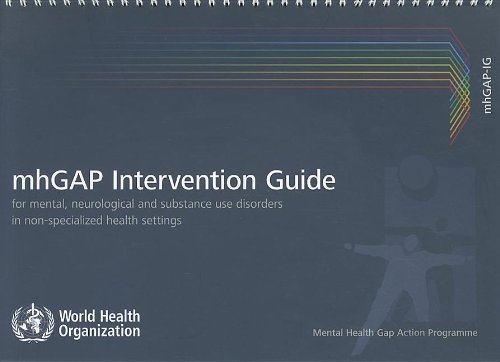MhGAP Intervention Guide for Mental, Neurological and Substance Use Disorders in Non-specialized Health Settings: Version 1.0 2010
دانلود کتاب پزشکی کتابچه راهنمای مداخله MhGAP برای اختلالات روانی، عصبی و مصرف مواد در تنظیمات سلامت غیرتخصصی: نسخه 1.0
| نویسنده |
Mental Health Gap Action Programme, World Health Organization, World Health Organization. Mental Health Gap Action Programme |
|---|
| تعداد صفحهها |
83 |
|---|---|
| نوع فایل |
|
| حجم |
3 Mb |
| سال انتشار |
2010 |
89,000 تومان
یک تصور رایج اما اشتباه وجود دارد که همه مداخلات بهداشت روان پیچیده هستند و فقط می توانند توسط کارکنان بسیار متخصص انجام شوند. تحقیقات در سال های اخیر امکان سنجی ارائه مداخلات دارویی و روانی اجتماعی در محیط های مراقبت های بهداشتی غیرتخصصی را نشان داده است. راهنمای مدل حاضر بر اساس بررسی تمام علوم موجود در این زمینه است و مداخلات توصیه شده را برای استفاده در کشورهای با درآمد کم و متوسط ارائه می کند. راهنمای مداخله شامل راهنمایی در مورد مداخلات مبتنی بر شواهد برای شناسایی و مدیریت تعدادی از شرایط اولویت است. شرایط اولویت شامل افسردگی، روان پریشی، اختلالات دوقطبی، صرع، اختلالات رشدی و رفتاری در کودکان و نوجوانان، زوال عقل، اختلالات مصرف الکل، اختلالات مصرف مواد، آسیب به خود/خودکشی و سایر شکایات عاطفی یا پزشکی غیرقابل توضیح است. این شرایط اولویت دار به این دلیل انتخاب شدند که بار بالایی از نظر مرگ، بیماری یا ناتوانی دارند، هزینه های اقتصادی بالایی دارند و با نقض حقوق بشر همراه هستند.
راهنمای مداخله برای استفاده در تنظیمات مراقبت های بهداشتی غیر تخصصی طراحی شده است. این راهنما برای ارائه دهندگان مراقبت های بهداشتی که در تسهیلات ردیف یک و ردیف 2 کار می کنند در نظر گرفته شده است. این ارائه دهندگان مراقبت های بهداشتی ممکن است در یک مرکز بهداشتی یا به عنوان بخشی از تیم بالینی در یک بیمارستان یا کلینیک منطقه کار کنند. آنها شامل پزشکان عمومی، پزشک خانواده، پرستاران و افسران بالینی هستند. ارائه دهندگان خدمات بهداشتی غیرمتخصص ممکن است با اصلاحات لازم از راهنمای مداخله استفاده کنند. امکانات سطح 1 شامل مراکز مراقبت های بهداشتی است که به عنوان اولین نقطه تماس با متخصص بهداشت عمل می کنند و مراقبت های پزشکی و پرستاری سرپایی را ارائه می دهند. خدمات توسط پزشکان عمومی یا پزشکان، دندانپزشکان، مدیران بالینی، پرستاران جامعه، داروسازان، و ماماها و غیره ارائه می شود. امکانات سطح دوم شامل بیمارستانی در اولین سطح ارجاع است که مسئول یک منطقه جغرافیایی یا منطقه تعریف شده است که دارای جمعیت مشخصی است و توسط یک سازمان سیاسی مدیریتی مانند یک تیم مدیریت بهداشت منطقه اداره می شود. پزشک منطقه یا متخصص سلامت روان از تیم مراقبت اولیه برای راهنمایی و ارجاع پشتیبانی می کند.
راهنمای مداخله برای تسهیل مداخلات افراد غیرحرفه ای پرمشغله در کشورهای با درآمد کم و متوسط مختصر است. این به طور مفصل آنچه را که باید انجام شود توصیف می کند و بر اهمیت آموزش ارائه دهندگان مراقبت های بهداشتی غیرمتخصص برای استفاده از راهنمای مداخله mhGAP برای ارزیابی و مدیریت افراد مبتلا به اختلالات روانی، عصبی و مصرف مواد تاکید می کند.
There is a widely shared but mistaken idea that all mental health interventions are sophisticated and can only be delivered by highly specialized staff. Research in recent years has demonstrated the feasibility of delivery of pharmacological and psychosocial interventions in non-specialized health-care settings. The present model guide is based on a review of all the science available in this area and presents the interventions recommended for use in low- and middle-income countries. The Intervention Guide includes guidance on evidence-based interventions to identify and manage a number of priority conditions. The priority conditions included are depression, psychosis, bipolar disorders, epilepsy, developmental and behavior disorders in children and adolescents, dementia, alcohol-use disorders, drug-use disorders, self-harm/suicide and other significant emotional or medically unexplained complaints. These priority conditions were selected because they represent a large burden in terms of mortality, morbidity or disability, have high economic costs, and are associated with violations of human rights.
The Intervention Guide has been developed for use in non-specialized health-care settings. The guide is aimed at health-care providers working at first- and second-level facilities. These health-care providers may be working in a health center or as part of the clinical team at a district-level hospital or clinic. They include general physicians, family physicians, nurses and clinical officers. Other non-specialist health-care providers can use the Intervention Guide with necessary adaptation. The first-level facilities include the health-care centers that serve as first point of contact with a health professional and provide outpatient medical and nursing care. Services are provided by general practitioners or physicians, dentists, clinical officers, community nurses, pharmacists and midwives, among others. Second-level facilities include the hospital at the first referral level responsible for a district or a defined geographical area containing a defined population and governed by a politico-administrative organization, such as a district health management team. The district clinician or mental health specialist supports the first-level health-care team for mentoring and referral.
The Intervention Guide is brief so as to facilitate interventions by busy non-specialists in low- and middle-income countries. It describes in detail what to do and emphasizes the importance of non-specialist health-care providers being trained in using the mhGAP Intervention Guide for assessing and managing people with mental, neurological and substance-use disorders.




